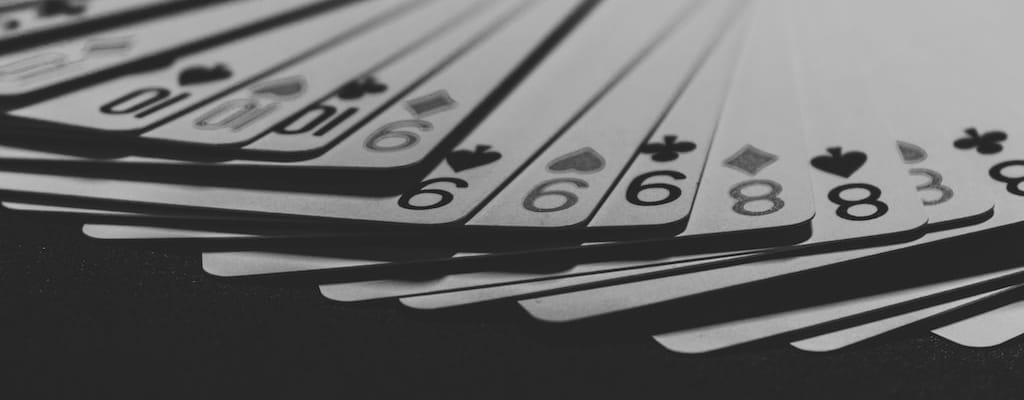five will get you ten: Idiom Meaning and Origin
What does ‘five will get you ten’ mean?
The idiom "five will get you ten" suggests a strong probability or certainty that a particular outcome will occur. It implies that if something is highly likely to happen, it can be predicted with confidence.

Idiom Explorer
The idiom "in the cards" means something is likely to happen or is destined to happen.
The idiom "I'll be bound" is used to express certainty or agreement with something. It implies that the speaker is confident in the truth or accuracy of a statement or prediction.
The idiom "hit the jackpot" means to achieve a great success or obtain an unexpected, significant gain, often in a financial sense.
The idiom "have it coming" means to deserve or expect something, usually negative, as a consequence of one's actions or behavior.
The idiom "had better" is used to advise or warn someone about a particular action they should take in order to avoid a negative outcome. It implies a sense of urgency or necessity, often indicating that there may be negative consequences if the suggested action is not followed.
An idiom that describes a situation where something unexpectedly turns out to be successful or advantageous, despite initial expectations. The outcome is usually positive, but may also involve a degree of unpredictability or chaos.
The idiom "gimme a five" is a casual request to have someone give a high five, a gesture where two people slap their open hands together above their heads. It is often used as a way to celebrate or show support.
The idiom "get what's coming to one" means to receive the punishment or consequences that one deserves for their actions or behavior.
The idiom "get there" means to achieve a goal or reach a desired destination. It implies successfully completing a task or journey.
Decoding Gambler's Bet
The idiom "five will get you ten" is commonly used in American English in a gambling context. It suggests that if you are willing to bet five dollars, you will receive a ten-dollar return. However, the meaning and usage of this idiom can vary.
One interpretation of this idiom is that it expresses a strong belief or confidence in a certain outcome. For example, someone might say "I'll bet you five will get you ten that it's going to rain today," indicating their certainty about the predicted outcome. In this case, the idiom emphasizes the speaker's confidence in their belief.
Another related idiom is "chances are." This phrase is often used to indicate the likelihood of something happening. For instance, you might say "chances are, if you leave your house without an umbrella, it will rain." This idiom is similar to "five will get you ten" in that it expresses a degree of certainty or expectation about an outcome.
A similar idiom is "a pound to a penny." This phrase is used to describe a situation where the odds of something happening are very likely. For example, you might say "it's a pound to a penny that she will win the race," indicating that the chances of her winning are high. This idiom shares a similar meaning with "five will get you ten" in terms of expressing confidence in an outcome.
Another related phrase is "even money." In gambling, this term refers to a bet where the potential winnings are equal to the amount being wagered. For example, if you bet five dollars and win, you receive a five-dollar return. This idiom is similar to "five will get you ten" in terms of the gambling context and the concept of a specific payout ratio.
Additionally, the idiom "fancy one's chances" can be connected to "five will get you ten." When someone fancies their chances, they believe that they have a good opportunity or likelihood of success. For instance, you might say "I fancy my chances of winning the competition" or "he fancies his chances of getting the job." This idiom shares a similar sentiment of confidence and belief in a desired outcome.
Furthermore, there is the expression "lay odds." This phrase is used in gambling to describe the act of offering or accepting a bet on a particular outcome. For instance, you might say "I'll lay odds that the home team will win" or "he laid odds on the horse to place in the race." This idiom relates to "five will get you ten" in terms of the betting and gambling context.
The idiom "five will get you ten" is commonly used in American English to indicate a specific betting ratio. However, its meaning can extend to expressing confidence or a strong belief in a certain outcome. Related idioms such as "chances are," "a pound to a penny," "even money," "fancy one's chances," and "lay odds" share similar concepts of certainty, confidence, and the gambling context. While the idiom's origin is uncertain, it likely emerged within American gambling subcultures and is predominantly used in the United States.
Example usage
Examples of how the idiom "five will get you ten" can be used in a sentence:
- I bet you five will get you ten that she'll be late for the meeting again.
- Five will get you ten that the team will win the championship this year.
- If you study hard, five will get you ten that you'll pass the exam with flying colors.
More "Wager" idioms
We missed the mark - nothing found.



